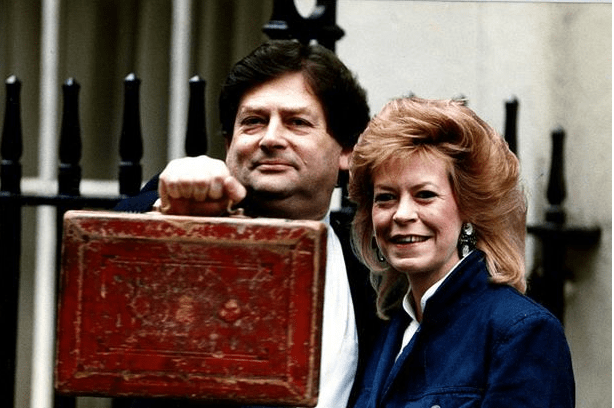I’ve just returned from a dinner given by the TaxPayers’ Alliance for Nigel Lawson to celebrate the silver anniversary his 1988 Budget, a great event with an all-star cast. Two of George Osborne’s ministers — Sajid Javid and David Gauke — were there at the Carlton Club alongside several of the brightest stars of the Tory backbenches*.
The 1988 Budget is remembered as the high water mark of Tory radicalism: Lawson’s speech was stopped twice by protests in the Commons as the implications of his reforms sunk in to his opponents. History was being made, and they were on the wrong side of it.
The personal allowance rate rose by twice the rate of inflation, corporation tax was cut from 27 per cent to 25 per cent, the top rate of tax from 60p to 40p and the basic rate from 27p to 25p. Government was getting smaller and people were getting bigger. A new Britain was being born. George Osborne was listening to that budget on a pocket radio on the bus home from school.
In his remarks, Lord Lawson said that Baroness Thatcher was anxious about cutting the top rate of 60p all the way to 40p, and thought 50p might be a better staging post. He persuaded her that it’s better to go to 40p in one go, and take the political pain up-front. A government’s authority, he argued, is never higher than in the first year of the parliament. Lord Lawson said he is not proud of having raised the personal allowance, as he disagrees with the concept of taking people out of tax as it weakens demand for lower taxes. It’s a shame, he said, that coalition has forced the government to do this.
I had the honour of introducing Lord Lawson, and made a couple of points about the 1988 Budget mentioned here on Coffee House a while ago. The Sunday Times Rich List was published for the first time that year: just 11 out of the top 100 were immigrants. A shame, said its editorial, Britain needs new wealth-creators. Entrepreneurs are a major production factor. Nowadays you can rely on at least 40 of the top 100 in that rich list being immigrants. They came flooding to Britain, creating jobs and wealth. Lord Lawson had realised what his overseas rivals took years to grasp: that, in the globalised world, countries must compete for people.
And the top rate of tax? This is most interesting of all. In 1986-87, the best-paid 1 per cent contributed just 14 per cent of all income tax. Once the top rate fell from 60p to 40p, the proportion paid by the richest 1 per cent soared to 21 per cent where it stayed. Here’s the magic at work:

‘the soundest way to raise the revenues in the long run is to cut the rates now … The purpose of cutting taxes now is not to incur a budget deficit, but to achieve the more prosperous, expanding economy which can bring a budget surplus.’







Comments